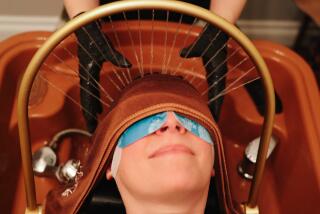If It Works for Humans, Why Not for Fluffy?
- Share via
Acupuncture for pets--using ancient Eastern medical arts to treat cats and dogs--is one of those ideas that seems, well, peculiar. Even many of those who now are proponents of it admit they found the idea a bit odd at first.
But in a culture that has emergency rooms, chemotherapy, dialysis, even insurance available for pets, it is perhaps not so surprising that acupuncture is an option for Socks and Sparky.
When Etta Cordova’s dog, Mei Siu, was in pain from a deteriorating spinal condition and didn’t respond to traditional treatment, she took her veterinarian’s suggestion to give Eastern medicine a try.
“My friend had acupuncture, and it worked,” said Cordova of Huntington Beach. “So I thought, why not for Mei Siu?” She says the treatments have enhanced her 13-year-old chow’s quality of life since they began in August. Mei Siu goes in for treatment twice a month and now feels good enough to bark at the cat, Cordova said.
According to the American Holistic Veterinary Medical Assn., one of several organizations promoting traditional Chinese medicine for animals, acupuncture’s primary use is to strengthen the body’s immune system, relieve pain and improve the function of organ systems. The treatment is given using special needles to stimulate acupuncture points on the surface of the body.
While many in the traditional veterinary community may not be comfortable with it, acupuncture for animals has long been used in Eastern cultures and is not new to the United States. It has been around since the late 1970s, but it seems to be gaining advocates. The American Holistic Veterinary Medical Center began with 40 members in 1982 and now has more than 800, according to Jane Clickner, of the Maryland-based group.
“It’s getting so popular because it works,” she says.
In veterinary waiting rooms in Southern California and around the world, the treatments are similar, using anywhere from one to 20 needles along the body’s channels of energy flow, called meridians. Pet acupuncture often is used in conjunction with Western medicine to treat allergies, neurological disorders, gastrointestinal problems and arthritis.
Donna Burley’s blue-point Siamese, Gretal, was weakened by asthma and too frail for surgery when she took her in for acupuncture in 1998. Although she’s getting along in years--she’s 12 now--Gretal is “hanging in there,” Burley says, getting treatments every two weeks. “After seeing it work, I would be open to it for myself.”
Like Cordova, Burley takes her cat to the Arroyo Pet Clinic in Lake Forest, one of dozens of veterinary centers in California that use acupuncture therapy for pets. David A. Gordon, a veterinarian also trained in acupuncture, treats hundreds of animals at the clinic with the technique.
“The good news is that it doesn’t hurt, and there are no side effects,” says Gordon, who has been treating pets with acupuncture since 1985.
“Our patients can’t tell us if it’s helping, but their owners say they can tell that their dogs and cats feel better, and they seem to relax right after the needles go in.”






